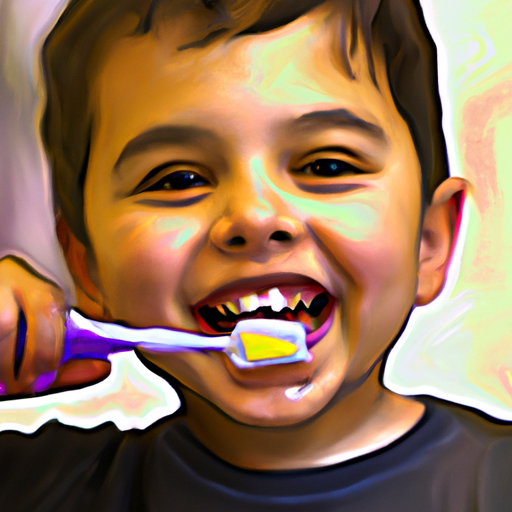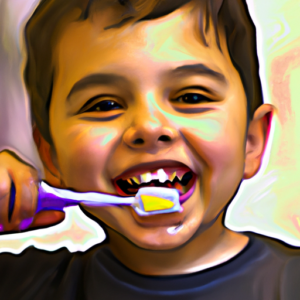Maintaining good oral hygiene is crucial for overall health, and this importance is amplified when it comes to children. As parents, it is our responsibility to ensure that our children develop healthy oral habits from a young age. In this article, we will delve into the various aspects of oral hygiene in children, including symptoms, causes, diagnosis, treatment, and prevention. Understanding these key factors will empower us to take proactive measures in promoting our children’s oral health. From recognizing early signs of dental issues to implementing effective strategies for building healthy habits, this article aims to provide valuable insights and expert tips to help parents navigate the realm of oral hygiene in children.
1. "Understanding the Importance of Oral Hygiene in Children: Symptoms, Causes, and Prevention"
Oral hygiene plays a crucial role in maintaining the overall health and well-being of children. It not only ensures a healthy set of teeth but also contributes to their speech development, nutrition, and self-esteem. However, many parents underestimate the significance of oral hygiene in children, leading to a lack of awareness about the symptoms, causes, and prevention of oral health issues.
One of the most common symptoms of poor oral hygiene in children is tooth decay. This can manifest as visible cavities, toothaches, or tooth sensitivity. If left untreated, tooth decay can lead to more severe problems such as infections and even tooth loss. Other symptoms include bad breath, swollen gums, and bleeding while brushing or flossing.
Several factors contribute to poor oral hygiene in children. Firstly, inadequate brushing and flossing techniques can leave behind food particles and plaque, promoting the growth of harmful bacteria. Additionally, excessive consumption of sugary foods and beverages can accelerate tooth decay and cavities. Irregular dental check-ups and a lack of professional guidance can further exacerbate the problem.
Prevention is key when it comes to maintaining good oral hygiene in children. Parents should introduce oral care routines at an early age to instill good habits. Brushing should be done twice a day using a fluoride toothpaste and a soft-bristled toothbrush suitable for children. Flossing should be incorporated into their routine as soon as their teeth start touching. Regular dental check-ups are essential for early detection and timely treatment of any oral health issues.
Apart from a consistent oral care routine, parents should educate their children about the importance of oral hygiene. Teaching them about the harmful effects of sugary foods and drinks on their teeth can encourage healthier eating habits. Limiting their consumption of such items and promoting a balanced diet can significantly reduce the risk of dental problems.
Furthermore, parents should lead by example and demonstrate proper oral hygiene practices themselves. Children are more likely to follow and adopt habits they observe in their parents or caregivers. By making
2. "Diagnosing and Treating Oral Health Issues in Children: Expert Tips and Best Practices"
Diagnosing and treating oral health issues in children requires a combination of expertise, care, and knowledge. As children’s oral health is distinct from that of adults, it is crucial to understand the unique challenges and considerations involved in their diagnosis and treatment. Here are some expert tips and best practices to ensure optimal oral hygiene in children.
1. Regular Dental Check-ups: Regular dental check-ups are essential for diagnosing and treating oral health issues in children. Dentists recommend scheduling a child’s first dental visit within six months of the eruption of their first tooth or by their first birthday. These visits allow the dentist to monitor the child’s oral development, identify any potential issues early on, and provide guidance on oral hygiene practices suitable for the child’s age.
2. Age-Appropriate Oral Examinations: Children’s oral examinations differ from those of adults. Dentists will assess the child’s overall oral health, including the development of teeth, gums, and jaw. They may also evaluate any existing dental appliances, such as braces or retainers, and check for signs of tooth decay, gum disease, or other oral health problems. Appropriate diagnostic tools, such as dental X-rays, may be used to obtain a comprehensive understanding of the child’s oral health.
3. Early Intervention for Dental Issues: Early intervention is crucial when diagnosing and treating oral health issues in children. Identifying dental problems, such as tooth decay or misalignment, at an early stage allows for prompt treatment and prevents potential complications. Dentists may recommend procedures such as dental fillings, sealants, or orthodontic treatment to address these issues effectively.
4. Educating Children and Parents: Oral hygiene education plays a vital role in preventing and treating oral health issues in children. Dentists should engage both children and their parents in discussions about proper brushing and flossing techniques, a balanced diet, and the importance of regular dental check-ups. By educating children and parents, dental professionals empower families to take an active role
3. "Building Healthy Habits: Effective Strategies for Promoting Oral Hygiene in Children"
Building Healthy Habits: Effective Strategies for Promoting Oral Hygiene in Children
When it comes to oral hygiene, instilling good habits in children is crucial for their overall health and well-being. Establishing a strong foundation of oral care from an early age not only helps prevent dental problems but also ensures a lifetime of healthy smiles. Here are some effective strategies to promote oral hygiene in children:
1. Lead by Example: Children are more likely to adopt healthy habits when they see their parents and caregivers practicing them too. Make sure you are setting a good example by maintaining a regular oral hygiene routine. Brush and floss your teeth together with your child, showing them the correct techniques and emphasizing its importance.
2. Start Early: Oral hygiene should begin even before the first tooth erupts. Gently wipe your baby’s gums with a clean, damp cloth after feedings to remove any residue. As soon as the first tooth appears, introduce a soft-bristled toothbrush specifically designed for infants and begin brushing twice a day.
3. Make It Fun: Engaging children in oral hygiene can be challenging, but making it a fun and interactive experience can help. Let your child choose their toothbrush and toothpaste with their favorite cartoon characters or colors. Sing a special toothbrushing song or create a game where they have to brush for a certain duration or reach all corners of their mouth. The more enjoyable the experience, the more likely they will be motivated to participate.
4. Supervise and Assist: Until around the age of 7 or 8, children may not have the manual dexterity to effectively clean their teeth on their own. It is important to supervise their brushing and assist when needed, ensuring that they are brushing for the recommended two minutes and reaching all areas of their mouth. Gradually, as they develop the necessary skills, allow them to take more responsibility.
5. Educate and Explain: Children are curious by nature, so take the time to explain why oral hygiene is


